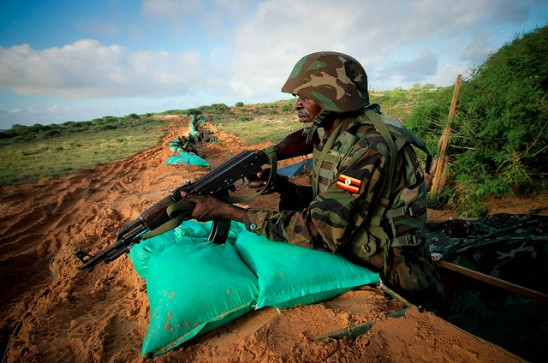 AMISOM soldier outside of Mogadishu, Somalia; UN Photo/Stuart Price.
AMISOM soldier outside of Mogadishu, Somalia; UN Photo/Stuart Price.
ASP Adjunct Fellow Matt Freear: ‘Branding Terrorism for What It Really Is’
Matt Freear, an adjunct fellow at the American Security Project (ASP), recently began a series entitled ‘Branding Terrorism for What It Really Is‘ on the Huffington Post that examines whether President Obama’s ‘latest pronouncement of the war on terror’ in his speech at West Point ‘will serve U.S. national security interests.’
Freear argues that the United States must revise its rhetoric of “us vs them” and adapt a more inclusive approach to combat extremism:
There is still too much about our approach that simply plays to the home crowd; “you’re either with us or against us”. It is the terrorists, not us, who want to see people divided by global “front lines” and never ending war. Clarity of purpose becomes difficult if the conflict is locally driven especially as we associate our enemy — what the president calls the “affiliates” and “extremists” — to a global movement that experts say became irrelevant some time ago.
Freear maintains that increased cultural understanding and interaction is key to a successful long-term policy:
As well as enabling shared knowledge and ideas, today’s globalization brings us and our differences closer together. The potential for conflict is heightened when the internet exposes inconsistencies and brings the long tail of radical and violent ideas to a growing online market of disgruntled youth. We need to redouble our efforts to listen to and communicate with other cultures.
Going forward, the U.S. must redouble its commitment to leadership through emphasizing its role in fostering peace rather than stoking the flames of war:
And, if freedom and democracy are becoming unattractive dead terms in U.S. foreign policy, especially where our leadership matters most, we need to re-brand U.S. foreign policy. Many counter-terrorism measures have been successful — albeit immensely costly — in defending our homeland but to lead globally we need to use the politics of peace rather than the language of war.
Freears’ series is sure to reignite much-needed debate about the direction and character of U.S. foreign-policy in the 21st century. Be sure to follow it as it continues on the Huffington Post.





